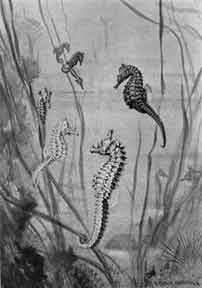A Motherly Knight in Armor
By WILLIAM BEEBE
Nature Magazine, March 1932
Page 1 | Page 2 | Page 3 | Page 4
There are three things of the sea that have been delineated by man more than any others dolphins, mermaids, and seahorses, and there are three things about which we know almost less than any others seahorses, mermaids and dolphins. I am sure that five thousand years ago some Egyptian or Chinaman or non-union stone mason of those days was daubing or hacking out an attempt at one or the other, and I know right well that at this very moment a young artist in a garret is drawing an original design of a pair of dolphins or seahorses with their tails entwined. I have awakened in a guest room where four walls revealed unending rows and columns of seahorses so awful that I had to leap out of bed to avoid counting them and calculating how many more there would be if the window space had been filled in.
I really believe we know more about mermaids than of dolphins or seahorses, for there is a splendid freedom of imagination which is engendered by uncertainty of the existence of any thing a freedom cribbed and confined by knowledge of actuality. Our medieval ancestors believed much more in mermaids than in other marine organisms, and I am sure that if a mermaid and a seahorse appeared for the first time at the same instant I should be much the more astonished at the latter.

My initial experience with a seahorse in Bermuda was from the point of a lusus naturae rather than as Hippocampus punctulatus. It was the first point of call of the Arcturus and we anchored at St. Georges in an afternoon's downpour of rain. I stayed only a few minutes on shore, went to a drugstore and bought the first thing I saw – a dried seahorse covered with gilt paint. Had I left it, its future would probably have been to collect dust on the what-not of some babbittian parlor, instead of which it performed a nobler function that of a leavening climax after many hours of intensive investigation, when, in a sudden burst of amazement, Will Gregory saw a golden seahorse lying amid the scarlet and ebony treasures from a mile-deep haul in the Sargasso Sea. This achieved successfully, it was thrown overboard and as it sank into the depths of mid-ocean, I knew that the slow disintegration even of a dry and gilded seahorse would bring nourishment and joy of life to a host of diminutive scavengers, and then I remembered that my shilling was still on its way from one Bermudian hand or pocket to another, and I was pleased with the destiny of my first seahorse.
If we keep on thinking mermaid hard enough we will probably come across something not unlike such a lady and much more wonderful. Things work out that way quite often, as in the case of the seahorse. When Aristotle and the poets of classical Greece wrote of Hippocampus they had in mind a wholly mythical sea-monster, a dragon, half-horse and half-fish. They thoroughly believed in this piscine-centaur and so there soon swam into their ken a half-horse and half-caterpillar, and Hippocampus being only imaginarily "preoccupied," as our taxonomists would say, it naturally fitted the new natatory reality. Medicine evolving slowly out of witch-doctors and magic, and museums not yet having come in, any creature as strange as a seahorse would, in those early days, be considered from the point of view of drugs. So we find attributed to it a marvelous list of panaceas. If I had only had a library of early chirurgeons on the Arcturus and a little more faith I would not so readily have consigned my dried seahorse to the deep, but would have burned it and consumed its ashes in wine and thereby have guarded against pains-in-the-side, or, had I taken it merely mixed with water, my canker and leprosy would have been alleviated. Best of all, had I stirred my Hippocampus ashes with oil of marjoram or liquid pitch and rubbed it on my bald pate a glorious head of hair would have resulted.
We may laugh at these prescriptions of old, but what except a feeling of shame shall we cherish toward an elaborate volume of seashore life, printed within three years, which states that Hippocampus is a primitive ganoid, that it lives to be a century old, and that it inhabits depths under great pressure! Before we ever smugly deride the ignorance or credulity of our ancestors let us stop a moment and recite the phrase "Remember Tennessee!" a mortifying but healthful exercise. To appreciate to the full a seahorse we must make ourselves believe that we are the first to discover it the initial playing of the Rosary, or September Morn fresh from the artist's brush, and all that sort of thing.
 Printer-friendly version
Printer-friendly version
